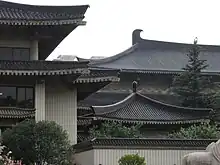张锦秋 | |
|---|---|
 | |
| Born | October 1936 Chengdu, Sichuan |
| Nationality | Chinese |
| Education | Tsinghua University |
| Occupation(s) | Architect and Professor |
Zhang Jinqiu (simplified Chinese: 张锦秋; traditional Chinese: 張錦秋; pinyin: Zhāng Jǐnqiū) is a Chinese architect and professor at Tsinghua University.[1] She was titled “Construction Master’ (1991) and “Academician of China” (1994) by the Chinese government.[2] She has been appointed as the Chief Architect for China’s Capital Construction Design Group since 1987 and remained in this position until the present day.[3] Zhang was also amongst the first round of winners of the Xi'an Science and Technology Award for Outstanding Contributions in 2005. By 2011, she was elected as a member of the prestigious Chinese Academy of Engineering.
Early life and education
Zhang was born in Chengdu, Sichuan province into a family that values education. Her aunt, Zhang Yuquan, is one of the first generation of women architects in China. She was raised by her parents "to have ambitions, to stand on my own two feet in society and not to rely on others."[4] She was one year old when the Second Sino-Japanese War started and China was invaded by the Japanese. Her family was evacuated to a remote countryside known as Xipu.[3]
Zhang graduated from Tsinghua University with a bachelor’s degree in Architecture (1960) and a master’s degree in Architectural History and Theory (1964).[3] She developed her interests in traditional and modern architecture studying under one of the pioneers of modern Chinese architecture, Liang Sicheng.[2] Her search for a modern Chinese architectural language was not smooth sailing - western and traditional Chinese architecture were rejected in the mid 1960s in favor of the Communist party's ideals. As academics, Zhang’s family was assigned to Xi’an in 1966, at the start of the Cultural Revolution.[3] Upon graduation, she was also assigned to work in Architectural Designing and Theoretical Pursuits at China’s Architectural Designing Bureau of North-western Region in Xi’an. She eventually rose to the position of Director, and she also earned the title of Chief Architect at China’s Capital Construction Design Group in 1987. The Chinese government declared Zhang a Mastery Connoisseur in Architectural Designing.[1]
Design Work
.jpg.webp)
For more than half a century, Zhang made her home in Xi’an, Shaan’xi Province. Her works focus on the unity and harmonious relationship between science and aesthetics, as well as between vernacular and modern. In the 1970s, she undertook the restoration of building structures and gardens of the Tang dynasty. Her ideas on utilising technological and scientific advancements were realised in her conservation and heritage projects, most notably the Shaanxi History Museum. The project is described as a modern architectural project by which traditional architectural elements are used as ingredients of innovation.[5] Beyond revitalising the ancient city and its history, Zhang’s designs present architecture features of the past in the modern context. This approach, often referred as the “Neo-Tang Style”,[6] gained popularity through her works.
Projects

The Huaqing Palace
Xi’an’s Bell Tower and Drum Tower
The Tang Lotus Garden
Main Hall of the Huandi Mausoleum
Yan’an Revolutionary Memorial Hall
Beijing Revolution History Museum
Awards
1994 awarded title of Academician of China.[1]
2001 Liang Sicheng Architecture Award.[1]
2005 Xian Science and Technology for Outstanding Contributions.[1]
2010 Science and Technology Achievement Award.[1]
References
- 1 2 3 4 5 6 "Zhang Jinqiu". www.hlhl.org.cn. Retrieved 2023-08-10.
- 1 2 "Zhang Jinqiu - China.org.cn". www.china.org.cn. Retrieved 2023-08-10.
- 1 2 3 4 Williams, Austin (2019). New Chinese architecture : twenty women building the future (in Chinese). London: Thames & Hudson. pp. 212–225. ISBN 0500343381.
- ↑ Lin, Fei (2006). Legendary life of the first generation of Chinese woman architect Zhang Yuquan. Tianjin University Press. p. 240.
- ↑ Yin, (Pao-Ning (March 1, 2015). "The Modernization of Contemporary Chinese Architecture and the Construction of Cultural Subjectivity: On the Case Studies of Architect Zhang, Jin-Qiu in Xi-An City (當代中國建築現代化與文化主體性建構─以張錦秋西安建築設計個案為例)". Urban Design Journal (城市與設計學報) (in Chinese) (22): 157–191 – via Airiti Library.
- ↑ "The Voice of Women in Chinese Architecture". ArchDaily. 2023-02-05. Retrieved 2023-08-10.